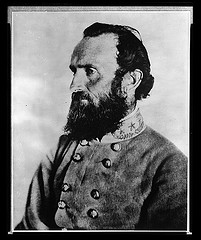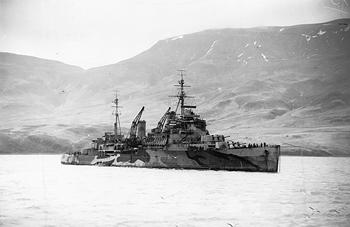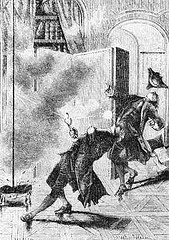
Stonewall Jackson was killed by his own troops. As he was reconnoitering after the Battle of Chancellorsville, a Confederate infantry regiment mistook him for Union cavalry and fired. He died a week later.

Stonewall Jackson was killed by his own troops. As he was reconnoitering after the Battle of Chancellorsville, a Confederate infantry regiment mistook him for Union cavalry and fired. He died a week later.
On Dec. 30, 1888, Joseph Néel killed a Mr. Coupard on the tiny island of Île Aux Chiens off the Newfoundland coast.
France, which owns the island, shipped a guillotine from Martinique so that Néel could be beheaded on Aug. 24, 1889.
He is the only person ever executed by guillotine in North America.
An hour before his death in April 1955, Albert Einstein muttered a few sentences in German.
The night nurse did not understand them.

In March 1942, HMS Trinidad launched a torpedo at a German destroyer.
The torpedo had a faulty gyro: It swam in a circle and returned to the ship.
Thirty-two men were killed.
Married: Moses Alexander, aged 93, to Mrs. Frances Tompkins, aged 105. They were married in Bath, Steuben county, N. Y., June 11, 1831. They were both taken out of bed dead the following morning.
— The Register of the Kentucky State Historical Society, 1938
During a party on July 9, 1993, lawyer Garry Hoy threw himself at a window on the 24th floor of the Toronto-Dominion Centre, to prove that it was unbreakable.
It wasn’t.
In Hitler Moves East, former SS officer Paul Carell records a bizarre scene from the bitterly cold winter of 1941 on the eastern front. At Ozarovo a rearguard of the German 3rd Rifle Regiment came across a group of Russian troops standing motionless in waist-deep snow. On investigating, they found that the Soviets, horses and men, had frozen to death where they stood:
Over on one side was a soldier, leaning against the flank of his horse. Next to him a wounded man in the saddle, one leg in a splint, his eyes wide open under iced-up eyebrows, his right hand still gripping the dishevelled mane of his mount. The second lieutenant and the sergeant slumped forward in their saddles, their clenched fists still gripping their reins. Wedged in between two horses were three soldiers: evidently they had tried to keep warm against the animals’ bodies. The horses themselves were like the horses on the plinths of equestrian statues — heads held high, eyes closed, their skin covered with ice, their tails whipped by the wind, but frozen into immobility.
Lance Corporal Tietz couldn’t take photos because “the view-finder froze over with his tears” and the shutter refused to work. “The god of war was holding his hand over the infernal picture,” Carell writes. “It was not to become a memento for others.”
Mottoes on English bells, collected by John Potter Briscoe in Curiosities of the Belfry, 1883:
And “Mankind, like us, too oft are found/Possessed of nought but empty sound!” (Bakewell, Derbyshire, 1798)

In February 1945, the British 14th Army had surrounded a mass of fleeing Japanese in a mangrove swamp in southern Burma. In the swamp were thousands of saltwater crocodiles, averaging 15 feet long, but the Japanese refused to surrender. The crisis came on the night of Feb. 19:
That night was the most horrible that any member of the [marine launch] crews ever experienced. The scattered rifle shots in the pitch black swamp punctured by the screams of wounded men crushed in the jaws of huge reptiles, and the blurred worrying sound of spinning crocodiles made a cacophony of hell that has rarely been duplicated on earth. At dawn the vultures arrived to clean up what the crocodiles had left. … Of about 1,000 Japanese soldiers that entered the swamps of Ramree, only about 20 were found alive.
That’s the account of naturalist Bruce Wright. If it’s accurate, this would be the worst crocodile attack — and indeed one of the deadliest animal attacks — in recorded history.

Georg Wilhelm Richmann was attending a meeting at the St. Petersburg Academy of Sciences in August 1753 when he heard thunder. He ran home with another man, hoping to record how an insulated rod responded to an electrical storm.
He succeeded, in a way: A ball of lightning leapt from the rod and struck Richmann in the head, killing him instantly and knocking his companion unconscious. That makes Richmann the first person in history to die while conducting electrical experiments.
Joseph Priestley wrote, “It is not given to every electrician to die in so glorious a manner as the justly envied Richmann.” That’s one way to look at it.